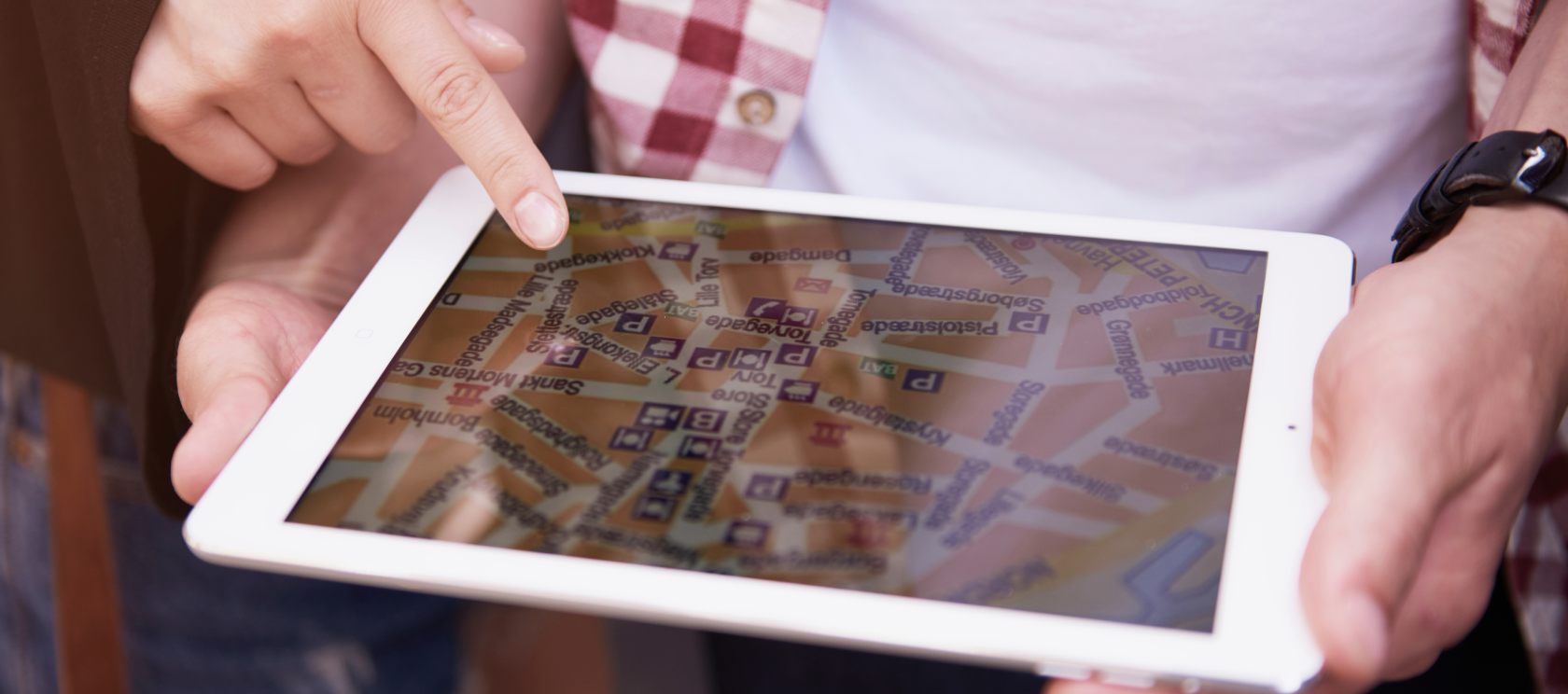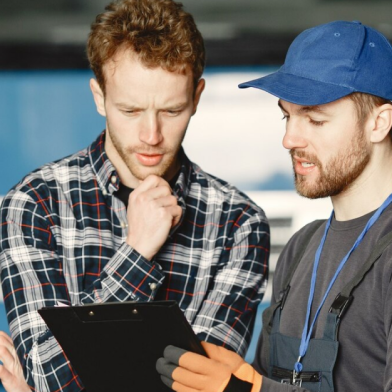Are you wondering how to create indoor navigation maps for your business?
Indoor maps can be a great way to help people navigate unfamiliar spaces. Companies use indoor navigation technology to map large buildings, better manage space, reduce energy consumption, improve safety, and so much more.
In fact, the global indoor navigation market size is expected to reach USD 30.20 billion by 2030. The substantial growth is primarily driven by the increasing demand for proximity marketing, augmented reality (AR), and location-based analytics. These technologies empower businesses to provide personalized experiences, improve advertising effectiveness, and enhance operational efficiency.

Source: Global indoor positioning and indoor navigation market size
However, indoor mapping presents several challenges to business owners, such as finding an accurate way to map the interior of a building, ensuring continuous updates to reflect changes, and achieving precise indoor positioning for location-based services.
In this article, you’ll learn how to create indoor navigation maps so that they are just right for your business. And if you have any questions or concerns after reading this article, please don’t hesitate to reach out to us via info@volpis.com. We specialize in custom indoor map app development and would be happy to assist you.
How to create indoor navigation maps for applications and web platforms: 8 critical steps
If you need to create your own indoor maps and develop a custom indoor mapping solution, our team has plenty of experience to get your project up and running quickly and ensure accuracy. But how exactly can you create indoor navigation maps? Let’s go over the steps involved in creating indoor navigation maps:
Step 1: Gather detailed floor plans and data
Obtain detailed floor plans of the building. To create indoor navigation maps that accurately reflect your venue, these plans should include precise measurements, room labels, and other relevant details. Gather additional data such as locations of entry and exit points, restrooms, elevators, stairs, and other important amenities.
Step 2: Choose the right indoor mapping software
Select an indoor mapping software or platform that suits your needs. There are various tools available that offer features like an easy drag-and-drop interface, 3D mapping, and integration with indoor positioning systems.
Step 3: Digitize the floor plans
Digitize the gathered floor plans using the chosen mapping software. This often involves tracing the floor plans using digital tools to create accurate and detailed digital maps.
Step 4: Integrate indoor positioning systems (IPS)
If you plan to enable real-time navigation, integrate an indoor positioning system (IPS) such as Wi-Fi positioning, Bluetooth beacons, or RFID tags. IPS helps in determining the user’s location within the building accurately.
Step 5: Design user interface and user experience
Develop a user-friendly interface for the indoor navigation application. Include intuitive icons, symbols, and labels for various locations on the map. Implement features like search functionality, turn-by-turn directions, and interactive elements to enhance user experience.
Step 6: Test the indoor navigation system
Conduct extensive testing of your indoor navigation system. Test various scenarios, such as different starting points, routes, and destinations, to ensure accuracy and reliability.
Step 7: Implement augmented reality (optional)
Consider implementing augmented reality features if you want to enhance user experience further. AR overlays digital information onto the real-world view through the user’s device camera, providing an immersive navigation experience. In this guide to developing augmented reality indoor navigation applications, you can find everything you need to build a comprehensive AR-based software solution that can bridge the gap between the digital and physical realms.
Step 8: Launch and gather user feedback
Launch the indoor navigation system and gather user feedback. Pay attention to user reviews and comments to identify areas of improvement. Regularly update the system based on user feedback and evolving user needs.
How do indoor navigation maps work?
Indoor mapping technology combines GPS with an indoor positioning system (IPS) to provide accurate information about indoor spaces. This allows for accurate tracking of objects and key points of interest (POIs) inside buildings.
Visitors can download the indoor navigation application or open it on a web or mobile device to receive live updates in real time.
The integrated map platform serves as a valuable tool for security data collection, ensuring that mapping providers can maintain up-to-date store data and location details.
These indoor navigation maps, enriched with location data, not only facilitate more efficient energy usage but also contribute to improved space management. They offer accurate floor plans that help users navigate complex indoor areas like shopping malls, meeting rooms, and stores.
Where can you use indoor navigation maps: top use cases
Indoor maps are a great way to navigate large spaces. They can be beneficial for a variety of settings. Let’s review some of the main use cases.
Stadiums
Stadiums and other large venues can create a memorable experience for your visitors. Custom indoor mapping solutions can help visitors find their seats, guide them to the right location, and provide information about toilets and stores.
Office buildings
Indoor mapping technology can help to create a more efficient workspace, improve productivity, and enforce social distancing measures. And with real-time asset tracking, you can monitor your inventory. Office buildings are home to many different types of equipment that need to be tracked to ensure the highest level of performance. With indoor mapping, you can pinpoint where each item is located on a map so that you know exactly what you have available at all times.
University campuses
When you’re walking around campus, there are a lot of places that can seem like they’re just out of reach. You could spend hours looking for the room you need to get to your next class, or you might need to find your way to a lecture hall or administrative office. Digital campus maps allow the school to offer personalized wayfinding experiences to users.
Amusement parks
Amusement parks are known for their fun, exciting rides and attractions. But when you’re in the park, it can be hard to find your way around. Instead of using a physical map, park visitors can enter their destination in the app and follow the directions. Location technology helps to make a park safer for families, reunite lost children with their parents, and allows security details to be dispatched immediately.
Leasing provider
Leasing a space can be tough, but it doesn’t have to be. You can create an interactive indoor map to walk potential tenants through a virtual tour of the space and demonstrate its various options for meeting their needs. With an interactive map, you’ll be able to show off your space in a way that makes it easy for tenants to visualize how they could use it—whether they’re looking for something tiny or large enough to host an event.
Grocery stores
You can build an in-store indoor map that guides shoppers through your store, giving them turn-by-turn navigation. Users can find the products they need by entering a search term and the indoor navigation app will provide them with the best route to direct them to the correct aisle.
Healthcare facilities
Healthcare facilities are often complex and confusing places. The use of indoor location-based technology allows users to navigate through the facility easily. You can keep track of your equipment and direct employees to the right supplies whenever they need them. It allows people to move around the facility without worrying about getting lost.
Airports
Indoor navigation systems can help cut down unnecessary movement within the airport, allowing passengers to find what they’re looking for, whether it’s a service (e.g., money exchange), product (e.g., burger), or gate. You can send out personalized real-time messages to your users, informing them of flight changes or reminding them of boarding times.
Hotels and resorts
Vacation getaways can be a great way to relax, but sometimes it’s hard to find the perfect place. That’s where location technology comes in. It can help people find the perfect destination for tier vacation, and even help make sure it’s a good experience for everyone involved. You can use an interactive resort map to reinforce your marketing and showcase your facilities with a virtual tour. With proximity marketing, you can trigger automatic notifications whenever a person reaches a particular zone – for example, you can draw their attention to the in-house cafe.
Transportation hubs
You can build an indoor map to support both passengers and employees by providing turn-by-turn navigation and informing users of schedules. Location-based technology can help you monitor the flow of passengers and identify areas where congestion is occurring. You can also optimize security routes and locate important equipment, as well as collect real-time data about users.
High schools
High schools are a key location for students and staff. They are also a major source of traffic congestion, especially in the morning when students arrive. Indoor mapping can help you identify overcrowded areas and restrict access to virus hotspots. Also, you can plan routes to designated evacuation points and avoid congestion in case of a crisis.
Convention centers
An indoor mapping solution can help attendees find the booths easily, with step-by-step directions from any point in the convention center. And facility managers can see which areas get the most foot traffic and optimize layout to encourage attendee flow.
Warehouses
Warehouses are a critical part of any operation, but they can be difficult to navigate. Indoor maps can streamline picking, provide workers with the fastest routes, and help to track items. With process automation, when a user enters a pre-mapped zone, specific notifications could be triggered.
Museums & art galleries
You can guide visitors through different exhibits. You can provide them with an innovative learning experience by incorporating interactive content, such as games, videos, and quizzes. Indoor mapping can help you gather user data, such as the average viewing time and the most popular spots. You will be able to plan more engaging exhibits, avoid crowd bottlenecks, and improve security.
Types of indoor maps and the features that differentiate them
Indoor mapping solutions have evolved significantly to accommodate a wide range of requirements and preferences. Designing maps with accuracy and clarity helps facility managers and visitors alike. Indoor maps come in various types, each offering unique features to cater to diverse needs:

1/ Floor plans
Providing a basic representation of indoor space, the floor plan encompasses walls, rooms, and hallways, delivering a comprehensive view of a building’s layout. The floor plan incorporates crucial labels for rooms, exits, stairs, elevators, and other essential features.

2/ 3D maps
Introducing a third dimension to indoor mapping, 3D maps enable users to visualize spaces with depth and perspective. Especially valuable for complex buildings with multiple floors and intricate designs.

3/ Interactive maps
Such maps empower users to interact with the map, enabling actions like zooming, panning, and tapping on specific locations. They support real-time updates, allowing users to view dynamic information like event schedules or available products in stores. Interactive maps often seamlessly integrate with Indoor Positioning Systems (IPS) for real-time location tracking and navigation.

4/ Augmented reality (AR) maps
AR maps enhance the real-world view through the user’s device camera. They provide a live, interactive view of the indoor environment with augmented information. Well-suited for smartphones or AR glasses, they seamlessly blend digital information with the physical environment.

5/ Wayfinding maps
Specializing in guiding users within large buildings or complexes, wayfinding maps offer turn-by-turn directions, guiding users from their current location to their destination. Typically includes features like voice guidance, estimated time of arrival, and visual cues to assist users in following the recommended path.

6/ Customized maps
Tailored to specific industries or businesses, customized maps incorporate personalized branding, themes, and colors. They may include venue-specific information, such as product locations in retail stores or meeting room availability in conference centers, delivering a unique and branded user experience.
Technologies required for indoor navigation app
Creating indoor maps is a great way to provide users with information about your facility. With this in mind, it’s important to make sure that the indoor maps you create are accurate. Now let’s look at technologies powering indoor maps.
Proximity positioning
Proximity positioning helps to establish direct contact between a receiver and a device. For example, when you measure the distance between a WiFi router and a smartphone, you understand its proximity positioning.
Trilateration positioning
Trilateration positioning is a method used to determine the location of an object by identifying its position in relation to known points which are usually radio wave emitters. Signal strength is used to determine the distance between two objects.
Fingerprint positioning
Fingerprinting location systems use signal strength measurements to detect the position of an object. Typically, signal intensities and coordinates are recorded in a database for future reference. When a new device is discovered on a network, its location is mapped based on previously acquired coordinates.
Motion positioning
Motion positioning can be used to determine the location of people’s movements in a place. Smartphones use accelerometers, gyroscope sensors, and magnetometers to determine the location of a device.
Bluetooth
By using Bluetooth and Wi-Fi radio networks, indoor positioning works in indoor environments where GPS inside buildings does not work.
Near-field communication (NFC)
Near-field communication tags can be placed throughout a property. The smartphone’s position is updated in real-time when devices come within range of a tag.
These indoor positioning technologies enable the collection of data to generate accurate indoor maps. These maps are instrumental in offering precise location details and enhancing the user’s experience. By utilizing these technologies, businesses can effectively navigate the challenges of indoor spaces, create floor layout and floor plan, and provide users with accurate indoor navigation map tailored to their indoor environment.
How much does an indoor navigation app cost in 2025?
The development cost of an indoor navigation app with innovative functionality can range from $20,000 to $100,000 or more.
The cost of creating an indoor map depends on your project requirements. In general, the more complex and detailed your design, the more you’ll pay for it. Costs can vary depending on such factors as:
- the size and complexity of the building (larger buildings typically require more resources);
- the number of floors;
- the amount of detail that is required;
- the type of data you need to include in the map.
Our experienced map developers can provide a quote and help you determine if it’s the right investment for your business. You can always connect with us via info@volpis.com
Our experience: how we develop indoor navigation apps
Cruise liner navigation app we built for Pinpoint Works
If you’re looking for an accurate and detailed indoor map, we’re here to help. We invite you to explore our portfolio for a detailed look at the innovative software systems we have developed for our clients.
Our skilled developers leverage the latest technology to create user-friendly interfaces, incorporating features like real-time location tracking, interactive maps, and personalized directions.
We’ll work with you to ensure that your map meets all of your requirements and is delivered on time.
Do you need to create indoor navigation maps for your business?
What if you could build an indoor mapping solution that accurately reflects your space, and make it easy for your customers to find their way around? With our indoor navigation app development services, you can create a mobile app for your customers that helps them find their way around your facility.
Consistently recognized as one of the Top Custom Software Development Companies on Clutch, Volpis harnesses the power of technology to help business owners create indoor navigation software and achieve remarkable milestones.
If you are looking for more information about creating indoor maps or our services, please reach out to us by filling out the form below or via info@volpis.com. Our team is always there for you.
Questions & Answers
FAQ
How do I set up Google Indoor Maps?
To initiate creating indoor maps for Google, access the Floor Plan tool. Submit your venue’s indoor map design for processing. Google then correlates this map with real-world coordinates, ensuring that the indoor mapping data aligns perfectly. Once this process is completed, your indoor map is integrated into Google Maps, enabling users to identify key points and other location details seamlessly.
Does Google Maps have indoor navigation?
Yes, it offers indoor navigation tailored for specific venues. This feature is especially beneficial for larger spaces like airports. The “blue dot” on the indoor map harnesses precise location data to guide users. By integrating the indoor map feature, it enhances the ability of customers to navigate through complex interiors effortlessly.
How much does an indoor navigation app cost?
The development cost of an indoor navigation app with innovative functionality can range from $20,000 to $100,000 or more. The cost of an indoor navigation app largely depends on its design complexity, the involvement of indoor mapping companies, and the depth of mapping data required. When creating an indoor map, considerations like points of interest, the accuracy of maps, and real-time location details play a pivotal role in determining cost. Different indoor navigation apps have varied pricing structures, but the best indoor mapping solution marries quality with budget considerations.
How much does Google Indoor Maps cost?
Google indoor maps, when used for businesses to showcase their venue, don’t typically have a direct cost. However, if you’re looking to leverage additional features or integrate indoor maps into a web or mobile device application, costs may arise from accessing the APIs. You can consult our developers or check out Google’s official documentation for precise details.
How do I create a venue map?
Creating a venue map begins by collecting data of the venue, such as floor plans. Identify important locations like restrooms, safety exits, vending machines, and security desk locations. Then you’ll need to incorporate internet-connected data sources to ensure live updates. It’s advantageous to work with specialized indoor mapping companies like ours for the best results. Regularly update maps, especially for dynamic venues like a shopping mall, to ensure they reflect any structural or tenant changes. Collect data periodically to maintain accuracy.
What is an internal map?
An internal map, often referred to as an indoor map, represents the layout within a closed space. These maps are beneficial for navigating complex spaces like smart offices and train stations. An indoor map can provide clarity on location details, aiding users in finding everything from all the shops to restrooms and first aid kits.
Can GPS be used for indoor navigation?
GPS relies on satellites and works best outdoors. Indoors, GPS signals can be weak or non-existent due to obstructions like walls and ceilings. You can incorporate GPS data with other technologies to enhance accuracy. More precise location data is often sourced from technologies alternative to GPS, such as Wi-Fi triangulation, Bluetooth beacons, and inertial measurement units. These alternatives provide more consistent and accurate location details indoors.
What is the alternative to GPS indoors?
Indoor navigation typically requires alternatives to traditional GPS technology due to the limitations of GPS for indoor locations. Solutions include Wi-Fi triangulation, Bluetooth beacons, and inertial measurement units. By combining these with limited GPS signals, indoor mapping solutions can offer a clearer representation of a user’s position within buildings. This hybrid approach is often adopted to ensure that users have the best indoor mapping experience possible. Different indoor navigation programs collaborate with various mapping providers to optimize the indoor map experience for users.
Can you use GPS indoors?
While GPS technology primarily works outdoors, limited signals can sometimes penetrate indoors. However, for reliable indoor mapping and navigation, most indoor navigation programs incorporate other data sources. These sources, combined with GPS, provide a more complete and accurate map, especially in places like shopping malls or train stations
Is there a free navigation app?
Yes, there are free navigation apps available for both outdoor and indoor purposes. While some might offer comprehensive features without charge, others might include in-app purchases or advertisements.
How accurate is indoor navigation?
The accuracy of indoor navigation depends on the technologies used. When indoor mapping companies create an indoor map using high-quality sources of data and combine it with technologies like Bluetooth beacons, users can often expect accuracy within a few meters.
Can I use Google API for free?
Google offers a free tier for its Maps API, but there are limits. Exceeding these limits, like a specific number of requests within a timeframe, incurs charges. It’s important to monitor usage closely to avoid unexpected costs.
What is the free limit for Google Maps API?
The free limit varies based on the specific API in use and changes over time. Google provides a certain number of free requests per month, after which billing starts. Always consult Google’s official documentation to get the most up-to-date and accurate details on API limits and costs. While there is no maximum number of requests per day, the following usage limits are in place for the Maps JavaScript API: 30,000 QPM (requests per minute). 300 QPM (requests per minute) per IP address.
How can I make my own map for free?
To make your own indoor map for free, numerous online tools and software allow for custom map creation. These tools often enable users to mark points of interest, incorporate internet-sourced data, and align maps with real-world coordinates.
How can I create a map with multiple locations?
To create a map with multiple locations, use mapping tools or software that allows for multiple data points. Input each location’s details, ensuring that accurate maps provide clarity for each point of interest. Many tools allow for the import of data sources, simplifying the process for larger sets of locations.
How to create a map of a building?
To create a map of a building, start by obtaining detailed architectural plans and relevant spatial data. At Volpis, our expert map developers use this information to accurately digitize these plans into interactive indoor navigation maps. We incorporate advanced location technologies, such as Wi-Fi and Bluetooth beacons, to enhance the maps’ precision and usability. Each map is custom-developed to meet the specific needs of your venue, ensuring optimal navigation and user experience.
How does Google Maps indoor navigation work?
Google Maps indoor navigation works by utilizing detailed floor plans and high-accuracy location technologies to guide users through complex indoor spaces like malls, airports, and large office buildings. When a building owner submits accurate floor plans to Google, these are integrated into Google Maps. As users navigate indoors, Google Maps uses GPS, Wi-Fi, cellular signals, and sensory data from the user’s device to determine their location with greater accuracy than GPS alone could provide in an indoor setting. This system allows users to see their position within a few meters, helping them to find specific stores, gates, or even offices inside the building. Additionally, Google Maps provides step-by-step directions to navigate between points within buildings, enhancing the overall user experience.
How to create indoor map in Android?
To create an indoor map in Android, start by obtaining detailed floor plans of the building you wish to map. Use the Google Maps API to overlay these plans onto a standard map, adding custom layers to represent different floors and areas. Implement indoor positioning technologies like Wi-Fi, Bluetooth beacons, or ultra-wideband for accurate location tracking within the building. Develop a user-friendly interface that allows for easy navigation, including search and direction functionalities. At Volpis, our expert developers specialize in leveraging these technologies to create indoor navigation maps, ensuring precise and intuitive mapping solutions for any venue.

Kostya Khuta, the CEO of Volpis, is an expert in crafting custom software solutions for the Fleet Management, Logistics, and Transportation industry. With over 8 years of experience, he leads the way in delivering innovative and tailored solutions to meet industry-specific needs.





